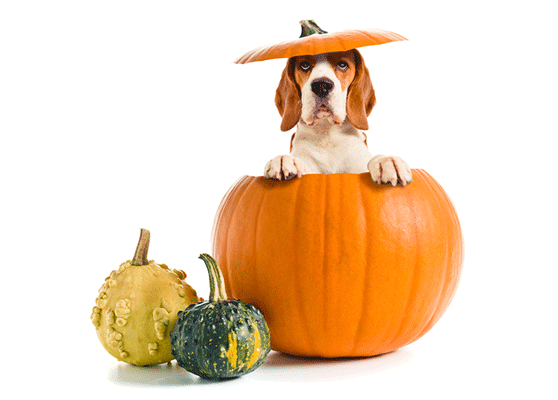Can Dogs Eat Pumpkins? Is Pumpkins Good Or Bad For Dogs
 |
| Can Dogs Eat Pumpkins? Is Pumpkins Safe For Dogs? |
Can Dogs Eat Pumpkins?
"Can dogs eat pumpkin?" You may be asking yourself this question if you want to share an autumn treat with your dog, or perhaps you have heard that pumpkin is good for an upset stomach. Humans can eat pumpkin, so is it safe for dogs?
The short answer is yes, your dog may have pumpkin. Pumpkin is not only a good change of pace for your puppy's palette, but it is also a healthy food for people to add to your dog's diet. However, you must be careful and serve pumpkin safely and in moderation to your dog.
As always, you should ask your veterinarian before sharing food with your dog, even pumpkin.
Here's what you need to know about feeding dogs with pumpkin.
Can dogs eat pumpkins? It has long been and widely recognized that pumpkin has definite benefits for dogs, especially those who have temporary difficulty performing successful bowel movements. Surprisingly, little goes a long way. PetMD recommends only a tablespoon of mashed pumpkin mixed with regular dog food to relieve both diarrhea and constipation. Note that it should be as simple as possible, so the pumpkin pie fills it because it is usually saturated with sugars which can only exacerbate loose stools.
How Is Pumpkin Good For Dogs?
Pumpkin is excellent for your dog's health for a multitude of reasons. It's packed with vitamins and nutrients your dog's body needs to function, including:
Vitamin A: helps your dog's immune system and vision
Vitamin C: facilitates enzymatic reactions in the body and the synthesis of collagen.
Alpha-carotene and vitamin E: antioxidants that regulate enzyme activity and prevent cell damage from free radicals.
Calcium: keeps your dog's bones and teeth strong while supporting cytoplasmic functions.
Iron: keeps your dog's hemoglobin level up, facilitates the circulation of oxygen at the cellular level.
Lutein: Helps in the health of your dog's eyes, skin, and coat.
Pumpkin is also full of fiber, which can help dogs feel full faster without necessarily absorbing too many calories. This makes pumpkin a great diet choice for dogs who need to lose some excess weight.
Pumpkin can also help digestion in dogs that suffer from constipation or diarrhea. If your dog is experiencing these digestive problems, try giving him a tablespoon of canned pumpkin mixed with his normal food.
Read More: Can Dogs Eat Onion?
What Type Of Pumpkin Is Safe For My Dog?
 |
| Can Dogs Eat Pumpkins? Is Pumpkins Safe For Dogs? |
dog in the field with pumpkin
Regular canned pumpkin is the best option for adding pumpkin to your dog's diet. When shopping for canned pumpkin for your puppy, be sure to get the regular pumpkin.
Canned pumpkin mixes, such as pumpkin pie filled with nutmeg and cinnamon, spicy mocha chai pumpkin, or one of the other varieties of canned human pumpkin that contain cinnamon, nutmeg or any other spice can cause serious digestive problems in your dogs or be toxic to your puppy.
How Can I Give My Dog The Pumpkin?
There are many fun ways to introduce pumpkin into your dog's diet.
Pumpkin is a great addition to dog food or dog treats. It can also be mixed with your dog's regular store-bought food.
However, you serve pumpkin to your dog, pay attention to the healthy portions for the food needs of your puppy. Always consult your veterinarian if you plan to introduce something new to your pet's diet.
Can Too Much Pumpkin Be Dangerous For Dogs?
 |
| Can Dogs Eat Pumpkins? Is Pumpkins Safe For Dogs? |
dog with head resting on pumpkin
It is important not to go overboard with pumpkin in your dog's diet, as too much could become toxic.
Pumpkin is loaded with beta-carotene, which dogs' bodies convert to vitamin A. Too much vitamin A is very toxic to dogs.
However, that doesn't stop you from introducing this beneficial gourd into your puppy's diet. A couple of teaspoons for small dogs or a few tablespoons of pumpkin for large dogs each day is just fine.
Potential Benefits Of Pumpkin For Dogs
Fiber: One of the main nutritional qualities of pumpkin is that it is rich in fiber (the plant material that cannot be broken down by enzymes in the body). It can contain up to five grams of fiber per ½ cup (122 g) serving and is also high in moisture. Some of the ways that fiber is beneficial for dogs are:
1. Weight control: the fibers promote a "feeling of satiety" even if fewer calories are absorbed. This can potentially help lose weight by decreasing the physiological need to eat more food; but as with all diets, consult your veterinarian first regarding your dog's specific needs.
2. Treatment of diarrhea: pumpkin contains soluble fiber which can absorb excess water in the digestive tract, reducing or relieving diarrhea.
Consult your veterinarian if your dog has been suffering from diarrhea for more than 24 hours or immediately if accompanied by any other sign of illness.
3. Constipation: Conversely, the high fiber content of a pumpkin can act as a laxative, which is a good thing because you want the gastrointestinal tract to continue to move steadily. The combination of fiber and moisture can be very helpful in creating volume that stimulates stool.
High in nutrients: pumpkin is full of nutrients that are beneficial for various body systems in dogs.
1. Vitamin A helps maintain the immune system and vision.
2. Vitamin C is a cofactor for enzymatic reactions and the synthesis of collagen.
3. Vitamin E is a fat-soluble antioxidant and a regulator of enzyme activity.
4. Alpha-carotene is an antioxidant that prevents cell damage.
5. Calcium supports cytoplasmic functions and mineralizes bones and teeth.
6. Iron contributes to cellular respiration, oxidation and the production of hemoglobin.
7. Lutein supports the health of the eyes, skin, and coat.
Read More: Can Dogs Eat Fries?
How To Feed Pumpkin To Dogs
 |
| Can Dogs Eat Pumpkins? Is Pumpkins Safe For Dogs? |
Ten good reasons to take turmeric
Do Not Feed:
The stem: it is thorny and rough on the digestive tract.
The skin may not digest well.
Dough: do not feed the soft, sticky material in the center.
Raw pumpkin.
Pumpkin or pie fresh or canned with additives, fillers, spices or sugar.
Jack-O-Lantern that was cut and left out. Mold or bacteria may have grown on these pumpkins, which can cause illness in dogs.
What To Feed:
Fresh seeds can be fed, but clean them and roast them at 350 ° F for 1 hour first. Do not add salt or spices. The shelf life of dry roasted seeds is less than one month. Grind the seeds before adding them to food.
100% canned pumpkin without additives, fillers, spices or sugar.
Fresh pumpkin cooked until tender. Remove the seeds and allow the pumpkin to cool before feeding it.
Ten good reasons to take turmeric
How Much Pumpkin To Feed Your Dog
Discuss the following recommendations with your veterinarian.
Use a level measuring spoon to make sure you are using the correct amount.
Small adult dogs: 1/2 teaspoon - 1 teaspoon pumpkin per day.
Average adult dogs: 1 tablespoon pumpkin per day.
Large adult dogs: 1 1/2 to 2 tablespoons of pumpkin per day.
Pumpkin seeds:
-Small adult dogs: (10 lb and over) 1/16 to 1/8 teaspoon per day.
- Average adult dogs: 1/4 to 1/2 teaspoon per day.
-Large adult dogs: 1/2 to 1 teaspoon per day.
Most dogs find the pumpkin very palatable.
At each step in the process of introducing pumpkin into your dog's diet, keep in mind the activity of the gastrointestinal tract and the firmness and frequency of bowel movements.
3 Surprising Health Benefits Of Pumpkin For Dogs
Your dog may be curious to see the pumpkins sitting on your porch. Halloween is now in the past, and your pumpkin may be beautifully carved, but it could also collect bacteria. While it is best not to eat this pumpkin, canned organic pumpkin (unsweetened - not the pie filling), pumpkin seeds and fresh cooked pumpkin have many benefits for dogs Pumpkin can help with the following ailments:
1) Digestive health: pumpkin is a fabulous source of fiber for our furry friends, as well as for us. Pumpkin puree (no added sugar or spice) can help dogs with constipation and diarrhea. Adding a tablespoon or two (in proportion to their size) to their regular meal is known to help them stay regular. It can also help dogs with indigestion or stomach upset. Gina loves it and would eat it right out of the box if it was allowed.
2) Urinary health: according to veterinarians Laci and Jed Schaible, co-founders of VetLIVE.com, pumpkin seeds are rich in essential fatty acids and antioxidants (good for healthy skin and fur) and the oils in the flesh and seeds of pumpkin are believed to support urinary health. They are also a great source of vitamin A, beta carotene, potassium, and iron, and can even reduce the likelihood that your pet will develop cancer.
3) Weight loss: dogs seem to naturally like pumpkin. If you're looking to shed a few pounds from your dog, try cutting back on some of their food and replacing it with the same portion of canned pumpkin. Their tummies will feel just as full, and they might even thank you for the extra flavor.
Raw, Cooked or Canned?
The raw and cooked pumpkin is safe for dogs. (If your dog has diabetes or chronic kidney disease, always ask your veterinarian first.) When it comes to our healthy poo, the seeds and flesh of fresh raw pumpkins are safe provided, though sure, it’s not a rotten pumpkin that sits on the porch for four weeks. Pumpkin pieces go rancid very quickly! If you choose to use preserves, make sure they are organic and have no added sugar.
Related Post :
Can Dogs Eat Fries
Can Dogs Eat Fish
Can Dogs Eat Ketchup
Can Dogs Eat Garlic

Comments
Post a Comment